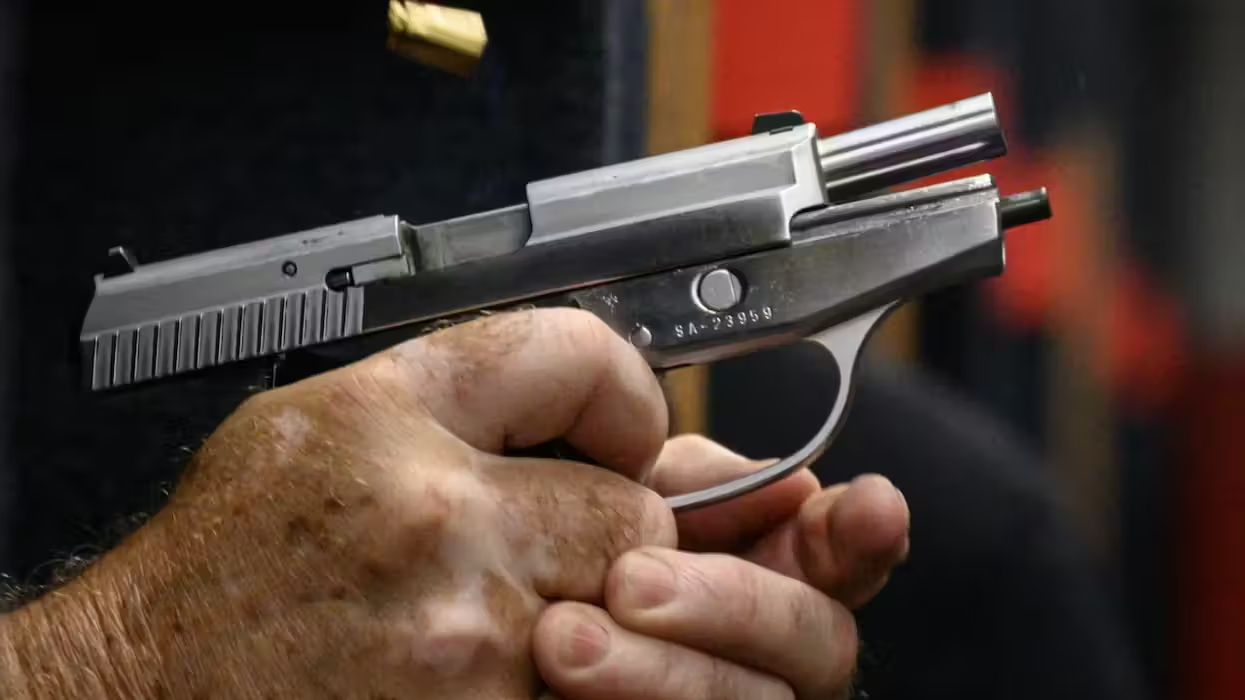
© 2025 Blaze Media LLC. All rights reserved.
Why Those in Humid States Are Specifically Being Urged to Pay Attention to This Airbag Recall
October 24, 2014
"It's in a total state of uproar."
DETROIT (TheBlaze/AP) — The owners of nearly 8 million cars and trucks are being told they should get their airbags replaced in a large recall, but it is those in humid states who should really pay attention to the problem.
Most of the 7.8 million vehicles subject to recalls for the airbag made by Japanese parts supplier Takata are in high-humidity areas — Florida, Puerto Rico, Guam, Saipan, American Samoa, the U.S. Virgin Islands, Hawaii and "limited areas near the Gulf of Mexico in Texas, Alabama, Mississippi, Georgia, and Louisiana," according to the National Highway Transportation Safety Administration.
 A Honda Motor Co. badge and airbag unit for the drivers seat are seen on the steering wheel of a Fit Hybrid vehicle in Tokyo, Japan, on Thursday, Oct. 23, 2014. The defect in Takata Corp. air bags linked to four deaths in Honda cars opens the supplier to risk of losing business in a crucial portion of the market for the safety devices. (Bloomberg via Getty Images)
A Honda Motor Co. badge and airbag unit for the drivers seat are seen on the steering wheel of a Fit Hybrid vehicle in Tokyo, Japan, on Thursday, Oct. 23, 2014. The defect in Takata Corp. air bags linked to four deaths in Honda cars opens the supplier to risk of losing business in a crucial portion of the market for the safety devices. (Bloomberg via Getty Images)
The government's auto safety agency said that inflator mechanisms in the air bags can rupture, causing metal fragments to fly out when the bags are deployed. Safety advocates say at least four people have died from the problem, which they claim could affect more than 20 million cars nationwide.
Why are vehicles in humid states so much more affected than others?
Automakers have been recalling cars to fix the problem for several years, but neither Takata nor NHTSA identified a firm cause. The agency opened a formal investigation into the problem in June, and a theory put forth in agency documents suggests the chemical used to inflate the air bag can be altered by high humidity, making it explode with too much force while deploying.
The warning in the U.S. initially applied to only about 3.1 million vehicles, but NHTSA added more than 4 million cars to the list later in the week. Worldwide, the recall issue extended to 12 millions vehicles.
"It's in a total state of uproar right now," said Clarence Ditlow, executive director of the Center for Auto Safety, a nonprofit advocacy group founded by Ralph Nader.
 The company is the North American subsidiary of the Japanese based Takata Corporation which supplies seat belts and airbags for the automotive industry. The government's auto safety agency says that inflator mechanisms made by Takata Corp. in the air bags can rupture, causing metal fragments to fly out when the bags are deployed. (AP/Carlos Osorio)
The company is the North American subsidiary of the Japanese based Takata Corporation which supplies seat belts and airbags for the automotive industry. The government's auto safety agency says that inflator mechanisms made by Takata Corp. in the air bags can rupture, causing metal fragments to fly out when the bags are deployed. (AP/Carlos Osorio)
Car owners might have difficulty determining if their vehicle is equipped with the potentially dangerous air bags. The warning covers certain models made by BMW, Chrysler, Ford, General Motors, Mazda, Honda, Mitsubishi, Nissan, Subaru and Toyota.
The agency urged people to use its website to see if their cars are affected.
NHTSA Deputy Administrator David Friedman said in a statement that responding to the recalls is essential to keep people safe.
"It will aid in our ongoing investigation into Takata air bags and what appears to be a problem related to extended exposure to consistently high humidity and temperatures," he said. The agency, he said, is tracking down the "full geographic scope" of the issue.
Two U.S. senators joined in Thursday, calling for the recall to extend nationwide.
Sens. Richard Blumenthal of Connecticut and Edward Markey of Massachusetts made the call in a letter to Transportation Secretary Anthony Foxx, who oversees the NHTSA. The letter also asks Foxx to encourage automakers to provide free loaner cars if parts aren't available.
In addition to being linked with some deaths, other injuries are known to occur with airbags as well, even those not necessarily included in the recall. Earlier this year, a medical case study showed the imprint of the airbag cloth pattern left on the eye of a woman who had been in an accident.
—
Front page image via Shutterstock.
Want to leave a tip?
We answer to you. Help keep our content free of advertisers and big tech censorship by leaving a tip today.
Want to join the conversation?
Already a subscriber?
more stories
Sign up for the Blaze newsletter
By signing up, you agree to our Privacy Policy and Terms of Use, and agree to receive content that may sometimes include advertisements. You may opt out at any time.
Related Content
© 2025 Blaze Media LLC. All rights reserved.
Get the stories that matter most delivered directly to your inbox.
By signing up, you agree to our Privacy Policy and Terms of Use, and agree to receive content that may sometimes include advertisements. You may opt out at any time.





